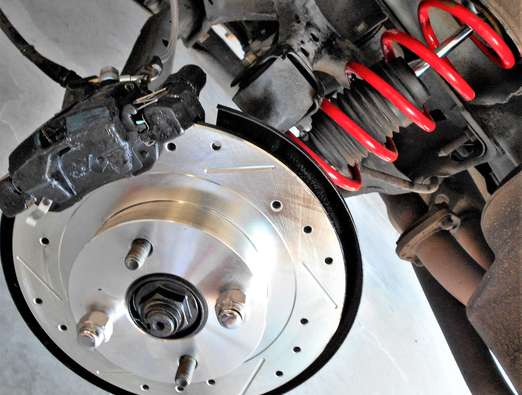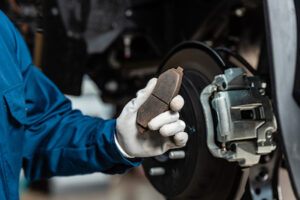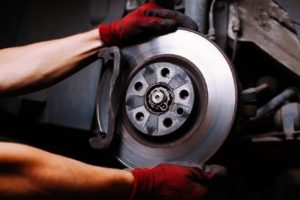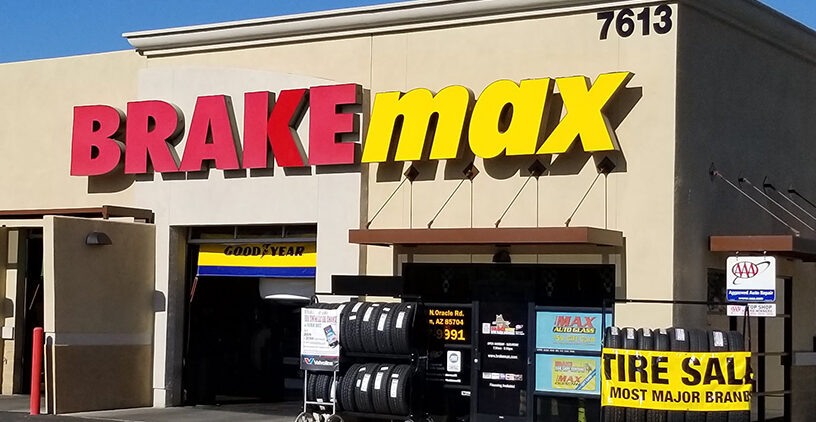Brake Service 101: Essential Elements of Brake Maintenance

Your car’s brake system is crucial for safe stops. Learn what makes this system work.
Brake pads, brake calipers, brake rotors—these critical components and more all contribute to your vehicle’s ability to safely come to a stop. With a name like BRAKEmax Tire & Service Centers, our experience centers heavily around this pivotal system in your vehicle.
Here, we’ll deep dive into all of the different aspects of your vehicle’s braking system and what happens when a brake repair is needed. Our brake service experts also lend their know-how for what to expect during a brake service at any one of our auto shop locations around Tucson.
Common Brake Components
Understanding how your brakes work can help you appreciate just how important they are for the safe operation of your vehicle. This understanding starts with learning about the different components in your braking system are knowing what they are responsible for.
Arguably, the three most important parts of your vehicle’s braking system are:
- Brake pads are a critical part of your
 vehicle braking system. That’s because your brake pads are what physically contact your brake rotors, which produces friction at pressure. It’s this pressure/friction combination being applied to your brake rotors that helps slow and stop your wheels.
vehicle braking system. That’s because your brake pads are what physically contact your brake rotors, which produces friction at pressure. It’s this pressure/friction combination being applied to your brake rotors that helps slow and stop your wheels. - Brake calipers serve as a housing for both the brake pad and the pistons, which makes the function of creating friction on rotors work. Think of the caliper as a hand that’s clamping down around the rotor to make it stop every time you push your brakes.
- Brake rotors: are the metal discs connected into your tire’s hub. Brake rotors work by providing a surface for your brake pads to be squeezed against, which in turn, produces the friction necessary to slow and stop your wheels. Rotors are actually two pieces of metal connected by ribs. This ribbing allows for the heat from the friction of your brake pads to dissipate safely.
It’s important to note, that while there are still a few older vehicles that have drum brakes, almost all cars on the roads today will have a disc brake system at least on their front wheels. Disc brakes are far more efficient and easier to maintain long-term.
Different Types of Brake Pads
Once upon a time, brake pads were made out of asbestos, which is great for dissipating heat, but as it breaks down it releases very dangerous dust. The three most common types of brake pads in use today are metallic brake pads, ceramic brake pads, and organic brake pads. We’ll go into a little more detail on each below.
Metallic Brake Pads
These are the most common types of brake pads on most vehicles today. A mixture of metals like steel, copper, graphite, and bonding materials are used to form the pad. These pads are economical and quite durable, with good performance and heat-dissipating properties, thus making them an ideal all-around choice for brake pads.
Ceramic Brake Pads
Ceramic brake pads are made for high-performance vehicles like race cars because of their superb ability to dissipate heat, their durability, and because they’re lightweight. Commonly composed of ceramic fibers, bonding agents, and often copper fiber, these brake pads provide great stopping power. But their construction also makes them quite expensive.
Organic Brake Pads
Also referred to as “non-asbestos brake pads”, organic brake pads are made from materials like glass, rubber, or resin. These materials have a high heat tolerance and are better for the environment. The downside is that these pads will typically wear down faster than other brake pads.
What to Expect During a Brake Repair & Service Visit
BRAKEmax facilities are stocked with the best tools and parts available to service your vehicle and our technicians are all ASE-certified to be able to service all vehicle types.
While the service performed can somewhat vary from vehicle to vehicle, during a typical brake service visit, our technicians perform the following services:
- Complete visual inspection of the brakes’ friction and hydraulic systems
- If possible, we’ll resurface the rotors and/or drums
- Provide a replacement of high-quality brake pads and shoes, if necessary
- If required, check and repack wheel bearings
At BRAKEmax, we offer a free brake check for drivers in Tucson because this system is simply too vital to the safe operation of your vehicle to ignore.
If you have even the slightest feeling that something isn’t quite right, let us know and our professionals will provide a thorough inspection of your complete braking system.
Book A Brake Service Appointment
How Often Should You Get Your Brakes Checked?
The amount of time between having your brakes checked may vary given all vehicles are not the same and everyone’s driving habits are different. Other variables like extreme temperature swings and the hot, arid environment we have here in Tucson can also play a factor.
As a general rule, you should have your brakes checked at least every 6 months, or every 6,000 miles, whichever comes first.
However, if you’re noticing any type of grinding, or squealing, or your vehicle is simply taking longer to stop, it’s a good idea to go ahead and schedule a brake service to have a professional check out what could be causing the issue.
Signs That Brake Service is Needed
Do you have to push down harder on your brakes or notice you don’t have the same stopping power you once did? These are all tell-tale signs it’s time for a brake service. However, there are a lot of other signs to look out for that can give you a warning that something is amiss.
If you are experiencing any of the following issues, you should get your vehicle in for a free brake check at your nearest BRAKEmax facility:
- Hearing any kind of grinding (think metal-on-metal) or squealing when you try to brake.
- Your vehicle’s Anti-Lock Brake System (ABS) light becomes illuminated on your dash.
- You feel your vehicle sway to a certain side after you brake.
- Having to pump or push hard to stop.
- Feeling a “spongy”, hard, or other out-of-the-ordinary feelings when braking.
- Seeing puddles of yellowish brake fluid under your vehicle.
If you have any issues like the above with your brakes, it’s best to get your vehicle in for a free brake inspection as soon as possible. Not having a fully functioning set of brakes is a frightening thought when traveling at highway speeds down I-10 in Tucson.
Where to Get Brake Repair Specials & Discounts
When looking for the best deals on brakes, always be sure to check out the BRAKEmax discounts page. We frequently have different promotions, discounts, and manufacturers’ rebates running, which change frequently.
We also offer a special financing option for holders of the BRAKEmax credit card offered through CFNA finance options. You’ll get low monthly payments that are more manageable when you need an important service, such as brake repairs.
Scheduling Your Brake Repair Service Online
At BRAKEmax, getting your vehicle in and serviced to the highest standards is our absolute priority. We understand most people don’t want to wait around for a long time, even in waiting rooms as nice as ours. That’s why we offer the convenience of online scheduling so that you can show up right when we’re able to get your brake service done.
Bonus, if your vehicle is within three miles of any of our BRAKEmax locations across the greater Tucson area, you can take advantage of our free pick-up and drop-off concierge service. We’ll get your vehicle, perform all the brake service and repairs required, and drop back off your vehicle—all for no additional charge.
Book A Brake Service Appointment
Frequently Asked Brake Repair Service Questions
How long should brake pads last?
Brake pads are designed to deal with friction from your braking system. Still, not even the best brake pads have an infinite service life. After enough time passes, you’ll need to start thinking about brake pad replacements from your nearest BRAKEmax location
Determining how long the brake pads you have now should last is a great way to get a head start on this process. Before you begin, you should know that figuring out your brake pad lifespan isn’t an exact science. Since countless variables are involved, just try to make your closest guess and work from there.
Are you constantly stuck in traffic in Tucson, Arizona? If so, your brakes will be under more stress than they would be if you dealt with stop-and-start conditions less frequently. On top of that, your braking methods can also extend or shorten your brake pads’ lifespan. “Riding” your brakes by constantly pushing down and easing up on your brake pedal can cause your brake pads to wear out prematurely.
Once you’ve thought about all these factors, you’re ready to begin estimating your brake pad lifespan. If you primarily drive in and around the city, expect these parts to last somewhere in the 30,000- to 35,000-mile range. But if you primarily drive in more rural areas, your brake pads may be able to last up to 80,000 miles.
What are the signs of worn brake pads?
If you make a point of being attentive while driving in the Tucson area, you might be able to spot early warning signs of brake pad problems. Perhaps the easiest way to tell when something’s amiss with your brake pads is to listen for a squealing sound from your brake system.
You might be inclined to assume that this noise means something’s wrong with your brake pads—and you’d be right to think so. Still, you should know that this sound is actually there by design. It’s created by a metal tab in your brake pad that rubs against your brake disc once a significant amount of material has worn away, letting you know it’s time for a replacement.
Other signs of brake pad wear include:
- Vibrations when you apply the brakes.
- Extra time is needed to fully stop.
- “Grinding” sounds.
- An active indicator light on your dashboard.
Any of these signs can indicate that your brake pads need to be replaced. As soon as you notice one or more of these factors in your Tucson-area vehicle, book an appointment at a local BRAKEmax brake repair shop right away! You can save on brake service with our reasonable rates and our online coupons.
Is it OK to replace just brake pads and not rotors?
When it’s time for you to replace your brake pads, you’ll also have another decision to make—whether or not you should replace your rotors simultaneously. Though this may be something you’re concerned about, you won’t have to make this decision without expert guidance.
If you visit a reputable business like BRAKEmax for brake pad replacements, the ASE-certified mechanics working there will inspect your rotors along with your brake pads. Before they start working on your brake pad replacement, they’ll let you know what they think should happen with your rotors. Depending on the state your rotors are in, they could be left alone, resurfaced, or replaced entirely.
Should you replace all four brake pads at once?
Are you trying to save money on brake pad replacements? If so, the thought of only replacing one or two brake pads at a time may be appealing to you. The good news is that if you follow some basic guidelines, you shouldn’t have to replace all four of your brake pads simultaneously.
In many passenger vehicles, front brake pads and other brake components on the front axle tend to wear out before the same parts on the rear axle do. When some of your car’s brake pads start to show signs of wear, you don’t need to replace all four pads. That said, it’s wise to replace both brake pads on the front or rear axle at the same time.
You may not be able to put off replacing some of your brake pads if you drive a high-performance vehicle. In many cases, these vehicles are designed in such a way that the front and rear brake components (including brake pads) will wear out at about the same time. For these vehicles, it’s always a good idea to replace all four brake pads and rotors during the same appointment.









